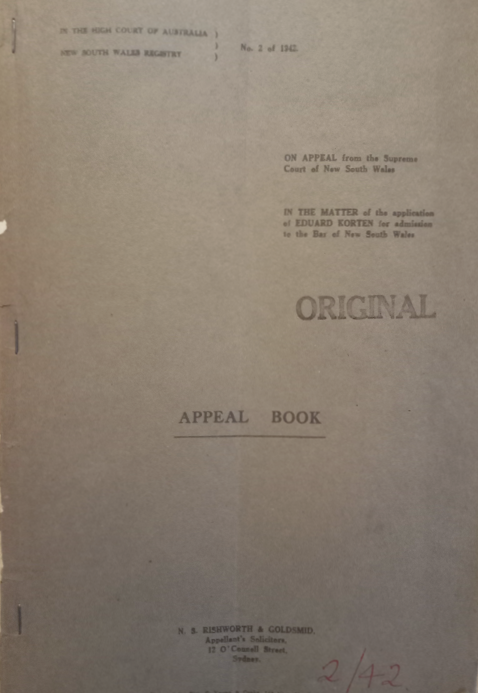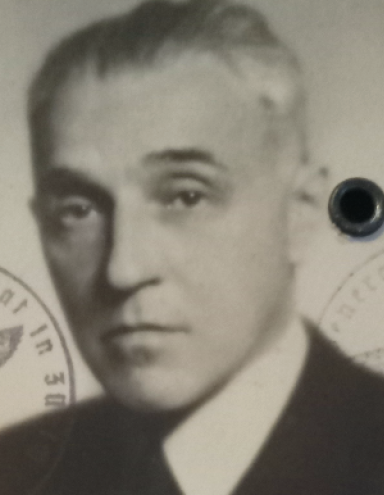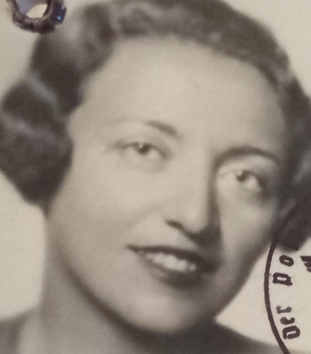Dr Eduard Korten: A Staunch Émigré Advocate against Nazi Crimes and Legal Injustices
.jpg)
T his year marks the 80th anniversary of a little-known decision of the NSW Supreme Court. On December 1941, Dr Eduard (Edward) Korten appeared before the full bench of the NSW Supreme Court (before Halse Rogers, Street and Maxwell JJ) in order to seek special leave to be admitted to legal practice in NSW. The court, however, decided to uphold the long-standing exclusion of non-British subjects from legal practice in Australia. 1 In particular, the court found that the NSW Barristers’ Admission Board had the authority to require all candidates for admission to the NSW Bar to be natural-born or naturalised British subjects.
This rule requiring British subjecthood as a precondition to entry into the Australian legal profession would remain in place in NSW until 1977, having been first repealed in South Australia in 1975 and as late as 1978 in Victoria.
Dr Korten was a Jewish barrister who had arrived with his wife Elvira and then 8-year-old daughter Susanne in Sydney in February 1939, after fleeing the violent Nazi annexation of Austria the previous year. Born in Vienna in 1888, Dr Korten was awarded a doctorate in law from the University of Vienna in 1911. He went on to develop a thriving practice in commercial insurance law at the Viennese Bar over the next 20 years, becoming widely regarded as one of the top barristers in Vienna by the late 1930s. However, like many of his Jewish compatriots, Dr Korten was formally disbarred from legal practice in November 1938 following the adoption of Nazi race laws enforced in the wake of the German invasion that forcibly retired or disqualified Jewish people from certain public professions.

Upon arriving in Sydney, Dr Korten, as a civil law trained barrister, was required to undertake and complete additional formal legal studies at the University of Sydney in order to meet the educational requirements of admission to legal practice. During this time, he befriended some of Sydney’s legal elite, including Judge Harold Nicholas who assisted Dr Korten to prepare for his Bar exams. Judge Nicholas was then a judge of the NSW Supreme Court (appointed in 1935, and promoted to Chief Judge in Equity in 1939) and even served on the NSW Barristers’ Admission Board. Nonetheless, these connections were not sufficient to facilitate Dr Korten’s admission to the NSW Bar at the time, with the NSW Barristers’ Admission Board twice rejecting his application for admission, first in November 1939 and later again in October 1942.
By way of background, the NSW Supreme Court Korten decision came just two years after a decision of the High Court of Australia in the Kahn case. 2 That case concerned another Jewish émigré lawyer, German-born Dr Rudolf Kahn, who had arrived in Melbourne just two months prior to the Kortens in December 1938 and who had also been refused admission by the Victorian Board of Examiners on a similar basis to Dr Korten. In the Kahn case, the High Court held that Victorian Council of Legal Education (the authority empowered under the then Legal Profession Practice Act 1928 (Vic) to make and alter rules for the admission of barristers and solicitors in Victoria) had ‘full power to prescribe a condition relating to nationality’ given the ‘wide terms’ under which the Council was empowered by the principal Act. 3


Dr Korten, too, sought leave to appeal the NSW Supreme Court decision to the High Court. Representing himself before the High Court on 27 August 1942, Dr Korten argued that he should be considered a stateless person, rather than an enemy alien, particularly given that he had fled Austria at the first possible opportunity following the German invasion and no longer had any duty or allegiance to either Austria or Germany. However, the representatives of the NSW Bar Association, Richard Clive Teece KC and Bryan Fuller KC, appearing as amici curiae, submitted that no alien, including stateless aliens, could be admitted to legal practice in NSW. On Latham CJ’s instigation, the court thus decided to indefinitely adjourn the appeal to allow Korten to submit a new application for admission to the NSW Barristers’ Admission Board in the future while also preserving his rights as an appellant. This means that while there is an official transcript of Korten’s High Court proceedings in the National Archives of Australia, there was never a formal judgment. 4 Unfortunately, for Dr Korten, the NSW Barristers’ Admission Board opted to also reject his second application for admission in October 1942.
Consequently, Dr Korten was required to wait the full five-year period stipulated at the time under the Nationality Act 1920 (Cth) until he was eligible for naturalisation. During this time, he managed to secure work as a legal clerk at the firm Rishworth & Goldsmid, although his efforts to earn an additional income as a translator, and even ski instructor, were much less successful.
Despite being initially refused admission to practice, Dr Korten sought opportunities to act as a public advocate to inform and influence public debate and opinion on World War II, Nazi crimes and their impact on Australia. During the early 1940s, he wrote numerous letters to newspaper editors on topics ranging from the injustice of German aggression and occupation in Europe, including in his Austrian homeland, to the situation facing Jewish refugees in Australia. In one letter to the Sydney Morning Herald , Dr Korten condemned the Nazi regime’s open derision of ‘the eternal idea of justice’, stating that:

‘The Nazis started with oppressing, robbing, and partly killing a helpless part of their own population. Feeling at that time not yet strong enough to attack foreign victims, they had to find out victims in their own country, vilifying and insulting them by a method which since has proved to be a general formula against everybody destined for their attack. Everyone in whose heart the old human longing for justice is not extinguished will follow the present struggle as a fight for everything that makes life worth living, and will wish to help whenever a chance should arise.’ 5
In a subsequent letter, Dr Korten advocated for the restoration of political independence to ‘all non-German peoples whose independence has been forcibly destroyed’ by Nazi occupation. He particularly stressed the case of Austria, where he asserted it would be inaccurate and unjust to conflate ‘German language as equal to German nationality’ and cautioned against assuming a ‘Nazi majority’ in occupied Austria. 6
In relation to Jewish refugees fleeing Nazi persecution, Dr Korten sought to promote an account of such refugees as being loyal to the British empire and their newly adopted home in Australia. For example, in another letter to the editor published in the Sydney Morning Herald in July 1940, he noted that even though German or Austrian Jewish refugees such as himself were ineligible for military service, their sympathies lay with the British war efforts. He wrote:
‘We, the Hitler-refugees in Australia, are for the time being not admitted to take our share in the struggle. But nothing can prevent our hearts from feeling fully with those men of the British forces and defence organisations, who are now willingly carrying on their shoulders the burden of defeating Nazi aggression'. 7
Subsequently, he would reaffirm that Jewish refugees fleeing Nazi persecution would ‘gladly accept anything looking like a useful contribution to the war, enlistment included’, and stressed the incongruity of the Australian official practice at the time of classifying such Jewish refugees as ‘enemy aliens’ alongside ‘the real enemy aliens’ namely non-Jewish German nationals in Australia who were Nazi supporters. 8
It would not be until 1944, after much correspondence with both the Australian Attorney-General’s Department and the Department of Interior, that Dr Korten was finally deemed eligible for naturalisation. On 6 March 1944, Korten’s naturalisation was approved, and Korten was admitted to practice as a barrister in NSW four days later. 9
After his admission to legal practice, Dr Korten still struggled to make a living as a member of the NSW Bar. Nonetheless, he continued to advocate for his fellow Jewish refugees who had sought refuge in Australia and in particular for Jewish refugees who were seeking to recover property confiscated under Nazis rule or who had been denied naturalisation in Australia on basis that they were not deemed to satisfy the future residency requirement. At the time, the Nationality Act 1920 (Cth) required that candidates for naturalisation intended to ‘reside in His Majesty’s dominions or to enter or continue in the service of the Crown’. 10 Dr Korten objected to how this provision was being interpreted in order to deny some Jewish refugees naturalisation. In July 1946, he submitted a ‘Memorandum on the policy of issuing certificates for naturalisation’ to the newly established Department of Immigration. He argued that withholding British nationality from certain Jewish refugees on the basis that they intended to travel abroad in the near future would impose ‘severe hardship’ on them and not be in the ‘best interests’ of Australia. He went on to write that:
‘Most of the applicants [for naturalisation] are people who have lost relatives through the extermination-policy of the Nazis, and who have suffered through the Nazis a very substantial loss of property. Most of the people so affected have the plan, and have had it for years, to visit Europe. Some of them want to attempt personal enquiries into the fate of their lost relatives, to visit their graves, if they can be found, to erect tombstones etc. They also expect some relatives to have survived the ordeal. Most of the people mentioned wish to recover at least part of their very substantial property. 11
Noting that he too wished to return to visit Austria, Dr Korten added that:
‘There has also been in many of us the wish for a last time to enter our countries of origin as free men and members of a new civilised community, after having left those countries as despised slaves. Probably many of us do not only wish to attend the graves of our dead ones, and to meet our surviving friends and relatives, but also to see some of those who took part in our expulsion, and to give them a piece of our mind.’ 12
He thus urged the Minister not to suspend a person’s application for naturalisation or to withhold naturalisation altogether in such cases.
In response, in November 1946, the Department of Immigration wrote to Dr Korten to clarify that there was no ‘hard and fast rule’ to withhold naturalisation from Jewish refugees wishing to travel abroad and that the Minister was prepared to consider applications for departure where ‘exceptional circumstances exists which justify it being given special consideration that the grant of naturalisation would be conducive to the public good and that the applicants’ absence from Australia would be for a comparatively short period’. 13
Tragically, Dr Korten’s life and work were cut short on 16 September 1948 when he collapsed and died aged 60 years on the footpath near Queen’s Square Courts in Sydney. Dr Korten was survived by his wife Elvira (now Ellen) and then 17-year old daughter Susanne, and he was buried in Rookwood cemetery in the Sydney suburb of Lidcombe. Although he lived in Australia for less than 10 years, Dr Korten’s story provides us with a glimpse into the reception and experiences of European émigré jurists, and Jewish refugee lawyers in particular, who arrived in Australia shortly before, during and immediately after World War II. His story allows us to appreciate how some Jewish refugee lawyers arriving in Australia in the mid-20th century forged new professional networks and become their own advocates, as well as the advocates for their fellow Jewish refugees, in the face of legal exclusions and restrictions in their newly adopted home.
This research on Dr Korten’s life forms part of a larger collaborative project co-led by a team of legal researchers at the Faculty of Law, University of Technology Sydney: Professor Katherine Biber, Dr Sara Dehm and Professor Ana Vrdoljak. This larger project explores the reception and contribution of European émigré jurists to the development of Australian legal institutions, legal education, and legal community. We are particularly keen to hear from any Bar News readers or members of the Australian legal profession who have stories or records of any European legally-trained émigrés who arrived in Australia between 1930 and 1960, including people who went on to practise or teach law in Australia, or people who may not have resumed their legal careers after emigrating to Australia.
This Bar News article is, in part, an abridged version of a longer account of Dr Korten’s story that will appear in the forthcoming publication: Sara Dehm, ‘Legal Exclusions: Emigre Lawyers, Admissions to Legal Practice and the Cultural Transformation of the Australian Legal Profession’, Federal Law Review (2021), issue 49(3). This longer publication contains full references to the archival materials and legal sources relied upon in this Bar News article. The author can be contacted at: sara.dehm@uts.edu.au
ENDNOTES
1 Ex Parte Korten (Unreported, Supreme Court of New South Wales, Halse Rogers, Street and Maxwell JJ, 11 December 1941).
2 Kahn v Board of Examiners (Vic) (1939) 62 CLR 422.
3 Kahn v Board of Examiners (Vic) (1939) 62 CLR 422, 428 (Latham CJ).
4 NAA: A10071; 1942/2.
5 E Korten, Letter to the Editor, ‘The Fight for Justice’, Sydney Morning Herald, 6 September 1939, p. 9.
6 E Korten, Letter to the Editor, Sydney Morning Herald, 6 October 1939, p. 4.
7 E Korten, Letter to the Editor, Sydney Morning Herald, 24 July 1940, p. 6.
8 E Korten, Letter to the Editor, Sydney Morning Herald, 30 December 1940, p. 2.
9 NSW Government, Law Almanac (1947).
10 Nationality Act 1920 (Cth) s 7(1)(c).
11 NAA: 435; 1946/4/5652.
12 NAA: 435; 1946/4/5652.
13 NAA: 435; 1946/4/5652.